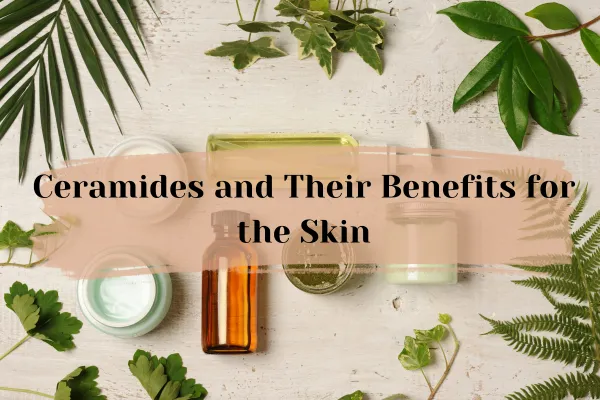
Ceramides and Their Benefits for the Skin
Ceramides and Their Benefits for the Skin
As someone who has sensitive, dry skin I’ve always been curious about what makes some skincare ingredients stand out, and ceramides have been a game-changer for me. Learning that they naturally occur in our skin made me appreciate their power even more. I noticed a significant difference after incorporating ceramide-rich oils like sunflower oil into my skincare routine—they’ve helped reduce dryness and left my skin feeling soft and calm. It's comforting to know I’m supporting my skin barrier with something so simple and effective.
What Are Ceramides?
Ceramides are naturally occurring lipids (fats) found in the outermost layer of the skin. They make up over 50% of the skin's composition, playing a vital role in maintaining a healthy skin barrier. Structurally, ceramides are long-chain fatty acids that interacts with other skin lipids like cholesterol and free fatty acids to form a protective barrier.
Functions of Ceramides
Barrier Support: Ceramides form a "mortar" between skin cells (the "bricks"), holding them together and preventing water loss. This barrier also protects against irritants, allergens, and pathogens.
Moisture Retention: By locking in hydration, ceramides combat dryness and flakiness, leaving skin feeling soft and smooth.
Skin Health Maintenance: Ceramides help repair and strengthen the skin barrier, especially for aging or damaged skin that naturally produces fewer ceramides over time.
Ceramides in Skincare
In skincare products, ceramides are often added to support or replenish the skin’s natural supply. They appear under names like ceramide NP, ceramide AP, and ceramide EOP. Products rich in ceramides are particularly beneficial for dry, sensitive, or mature skin.
Why They’re Important
Aging, environmental stress, and overuse of harsh skincare products can deplete the skin’s ceramide levels. This leads to weakened barriers, dryness, and inflammation. By replenishing ceramides, you help restore the skin's natural defense and hydration.
Oils Rich in Ceramides
Plant oils high in ceramides are fantastic for nurturing the skin barrier and locking in moisture. Here’s an updated list featuring nutrient-dense and healthier options:
Hemp Seed Oil: ~58% ceramides – Packed with omega-3 and omega-6 fatty acids, hemp seed oil is anti-inflammatory and deeply nourishing.
Sweet Almond Oil: ~48% ceramides – Known for its hydrating and soothing properties, it’s great for sensitive skin.
Grape Seed Oil: ~32% ceramides – Lightweight and rich in antioxidants, this oil supports skin elasticity and protects against environmental stressors.
Sunflower Oil: ~34% ceramides – Gentle and effective, it hydrates without clogging pores.
Wheat Germ Oil: ~55% ceramides – A vitamin E powerhouse, it promotes skin healing and hydration.
These oils not only offer ceramides to restore your skin barrier but also provide additional nutrients like vitamins and fatty acids that elevate their skincare benefits.
Why Cold-Pressed Oils Matter for Ceramide-Rich Skincare
When it comes to incorporating ceramide-rich oils into your skincare routine, the method of extraction plays a significant role in preserving their quality and benefits. Cold-pressed oils are extracted mechanically without the use of heat or chemical solvents, which ensures the oil retains its natural nutrients, including ceramides and other vital fatty acids.
The Importance of Cold-Pressed Oils
Preserves Nutrients
Heat and chemicals used in other extraction methods can degrade sensitive compounds like ceramides, vitamins, and antioxidants. Cold pressing ensures these beneficial components remain intact, maximizing the oil’s skin-nourishing properties.Retains Purity
Cold-pressed oils are free of residues from chemical solvents often used in refined oils. This makes them ideal for sensitive or reactive skin, as they are less likely to cause irritation.Environmentally Friendly
The mechanical extraction process of cold pressing is more eco-friendly compared to industrial refining processes, which often produce chemical waste.
Why I Prefer Sunflower Oil
Out of all the ceramide-rich oils, sunflower oil is my favorite. It’s gentle, non-comedogenic (won’t clog pores), and works beautifully for all skin types, including sensitive and acne-prone skin. Sunflower oil contains approximately 34% ceramides and is rich in vitamin E, an antioxidant that protects the skin from free radicals.
Here’s why I turn to sunflower oil:
Lightweight and Versatile: Its lightweight texture makes it ideal for use on the face and body without feeling greasy.
Non-Irritating: Sunflower oil is mild enough for sensitive or inflamed skin, offering soothing benefits while helping to restore the skin barrier.
Anti-Inflammatory Properties: It can calm redness and irritation, making it a great choice for those with conditions like eczema or rosacea.
Affordable and Accessible: It’s easy to find, making it an affordable yet effective addition to your skincare routine.
Sources:
MindBodyGreen: "What Are Ceramides? Benefits, Types, And The Best Products"
Byrdie: "Ceramides Are Exactly What Your Skin Barrier Needs—Here's Why"
Healthline: "What Are Ceramides in Skincare?"
